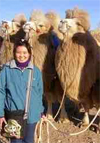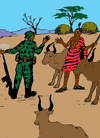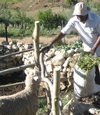Community conservation of Alashan camels in Inner Mongolia

Efforts by the Alxa Camel Conservation Association, an organization of camel herders in Inner Mongolia, in China, have halted the decline in numbers of the Alashan or Alxa, camel, a double-humped Bactrian breed.
Read Ilse Koehler-Rollefson’s report of their work for the DryNet initiative here.
Workshop on pastoralism and conservation

Pastoralists frequently come into conflict with conservationists who accuse them of causing overgrazing and soil erosion. But that is far from the truth, according to recent research. On the contrary, pastoralists are often custodians rather than destroyers of biodiversity and the environment.
LPP is organizing a workshop on “Enhancing the role of pastoralism in the conservation of dryland eco-systems” at the IUCN World Conservation Congress in Barcelona on 7 Oct 2008.
The evening workshop will feature presentations by pastoralists and experts with hands-on experience in India, Tanzania, Mongolia and Spain.
The workshop will provide pastoralist support groups with information and assistance in making their case, as well as give conservation practitioners insights into the role and potential of pastoralists in conserving drylands. The purpose is to distil some best practices about the integration of pastoralists into conservation efforts.
Role of livestock keepers in the Global Plan of Action

LPP member Evelyn Mathias gave a presentation on the role of livestock keepers in the conservation of farm animal diversity and the Global Plan of Action for Animal Genetic Resources at a meeting of European national coordinators on animal genetic resources in Vilnius, Lithuania, on 21 August 2008.
Click here to view her presentation 151 kb.
- Go to the previous page
- 1
- …
- 53
- 54
- 55
- 56
- 57
- 58
- 59
- …
- 82
- Go to the next page
